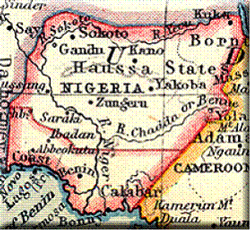History Matters: If you paid a $4 poll tax in 1910, your great-grandchild gets a polio vaccine today
 In colonial Nigeria in the last years of the 19th century, a strange quirk of history led the British rulers to draw an arbitrary boundary line along the 7˚10' N line of latitude, separating the population into two separate administrative districts.
In colonial Nigeria in the last years of the 19th century, a strange quirk of history led the British rulers to draw an arbitrary boundary line along the 7˚10' N line of latitude, separating the population into two separate administrative districts.
Below the line, the colonial government raised money by levying taxes on imported alcohol and other goods that came through Southern Protectorate’s sea ports. Above the line, the administrators of the landlocked Northern Protectorate had no sea ports, and instead raised money through direct taxes. In the areas near the border, this took the form of a simple poll tax, where tax officials collected from each citizen the equivalent of between $4 and $20 in today’s dollars.
Could this seemingly minor difference—created over a century ago by a long-defunct colonial administration, and long ago erased by subsequent administrative divisions—possibly still matter today?
Yes, it could, according to Daniel Berger, a PhD student in politics at NYU. Berger’s paper, Taxes, Institutions and Local Governance: Evidence from a Natural Experiment in Colonial Nigeria, finds that the “simple act of having to collect taxes caused governments to be forced to build the capacity which can now provide basic government services.” As a result, governance today is “significantly better” in areas just above the line than in those just below it.
After looking at historical evidence and running statistical tests, Berger finds that there is no evidence of pre-existing differences among the people living very close to the arbitrary boundary on either side, and so is able to rule out the possibility that some third factor could account for the differences in governance that remain today.
The results are threefold. Berger uses Afrobarometer public opinion data to show that residents just above the line are happier with their local governments, and his use of demographic survey data shows that local governments just below the line spend 10 percent more of their budget on salaries ("an indicator of less competent government.") Zeroing in on the propensity of mothers to vaccinate their child as a way to get at a precise measure of the quality of public service delivery, Berger finds that “living just below the line leads to a 10.7 percentage point reduction in the probability that her child will be vaccinated for polio.”
The conditions created by the administrative division led to two different equilibria, which help explain how the differences above and below the line were able to persist over time:
In the first, the local government does little except extract what few bribes it can….There is no incentive for hard work, as bureaucrats will neither be able to extract appreciably more rents (due to the limited amount of money available in the local economy) nor will they be able to improve government functioning on their own (since efficient functioning requires the entire bureaucracy working together). This also leads to a knock on effect on the human capital available to the local governments as the families which control the local government have no reason to steer their smartest children into local government service.
The second equilibrium is one in which significant services are actually delivered. Here, the local government is capable of delivering local basic public services with a reasonable level of efficiency and honesty. This grants sufficient legitimacy to the local government that they are able to collect local taxes, which never go to the center. They can then pay themselves regularly despite the fact that they are not regularly receiving the transfers they are due from the center. Here hard work does make a difference.
Berger’s conclusions also speak to the strength of norms and informal institutions. While the formal institutions—the idiosyncratic colonial structure of taxation—that created the original difference in bureaucratic capacity were long ago swept away, it is the informal norms, transmitted across generations, that persist and lead to the different outcomes we see today.
You may wonder what whim caused the British create this artificial boundary in the first place. The literature tells us that the British were worried that a colonial official senior enough to administer the whole undivided territory of Nigeria would be too old and too weak to survive the malarial climate. By cutting the province in two, the British could send two younger and heartier (but less-experienced) governors instead.
So, to simplify: measurable differences in the perception and quality of local government provision service persist between otherwise identical populations just north and south of Nigeria’s the 7˚10' N latitude line…all for fear of a malarial mosquito.
 From Aid to Equality
From Aid to Equality
